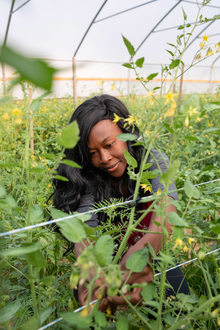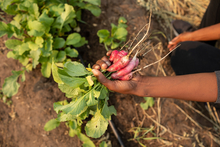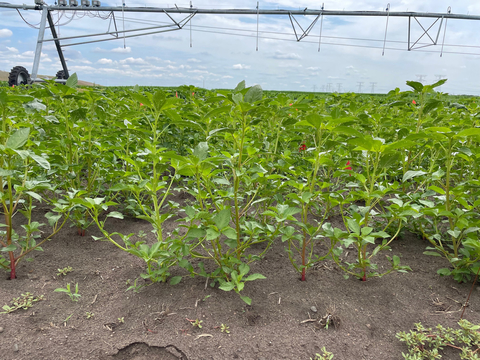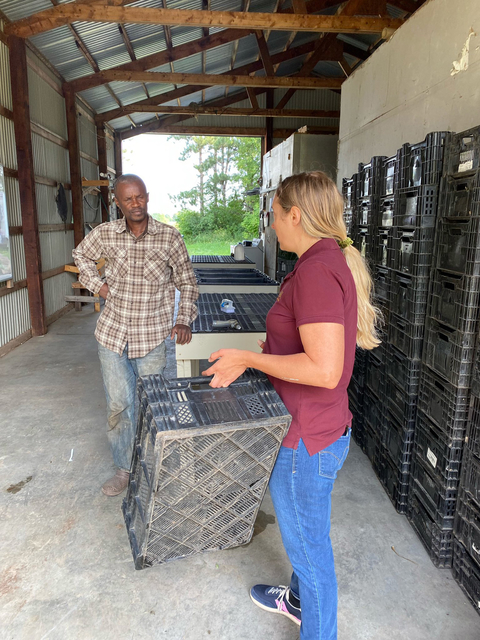Lakisha Witter didn’t imagine a life in growing food, but now she is helping other emerging farmers
Sometimes, life takes unexpected turns. For Lakisha Witter, that turn was toward farming. “I never saw myself as being a trailblazer in farming,” she says. An education professor who trains future teachers, Witter had no experience with agriculture.
Witter’s farm, Live Organically, is a small vegetable operation in Oak Grove. Organic farming may sound idyllic, but it’s a lot of work. In the summer, Witter’s day starts around 3:45 a.m. She begins with a cup of coffee and activities that build her up — a devotional, journaling or listening to worship music. Then she heads out to the fields before the sun gets hot.
She adapts her plans according to the weather and the needs of the crops, but an early start and long hours are routine.
Costs and efforts are high; help is available
Emerging farmers, meaning those who are newer to farming and don’t have that family history, face many challenges. According to Natalie Hoidal, an Extension educator in horticulture who works primarily with vegetable farmers, land access may be the most significant barrier emerging farmers face.
Witter’s story is unusual because she was able to purchase land for her farm. Purchasing land is just the beginning of the expenses. Equipment and supplies are also a significant cost. In her first year, Witter did not have a greenhouse, so she had to pay someone else to start her seeds. Before she had a drip irrigation system, she spent hours watering each day.
Applying for and receiving grants aimed at newer farmers helps Witter continue to grow her farm.
Funding and equipment are only part of the picture. Successful farming requires specialized skills and knowledge. Growing healthy plants, especially at scale, is no easy task. For someone without farming experience, the learning curve is steep. It takes a willingness to learn and support from more experienced farmers for a new farmer to develop confidence and skills.
“My success and what I’ve accomplished so far has come from the networks and partnerships I’ve built with other farmers and organizations, and being able to be resourceful with what’s out there,” Witter says.
Asking for help, then paying it forward
Witter is not afraid to ask questions and admit when she doesn’t know something. She has built a support network by introducing herself to neighbors, meeting fellow farmers at conferences and cold calling farmers in her area. Their generosity has motivated Witter to do the same to help newer farmers now that she has some experience.
The hands-on experience of having more seasoned farmers show her how to do things supplements her formal learning and online research. For example, Witter read about squash vine borers on Extension’s website, and a farm mentor cut open a squash vine in the field to show her the larvae that were damaging her crop. The combination of research-backed information and hands-on mentoring has been key to Witter’s growth.
Extension educators are part of the network supporting emerging farmers, providing connections, information and resources. “Extension has supported farmers for generations,” says Hoidal. “And so it’s really important that we’re reflecting our community, that we are helping all farmers to thrive.”
Studying new crops for Minnesota
Natalie Hoidal is part of a research project studying crops that have not previously been grown in Minnesota. The research team is working with Kenyan and Somali farmers who are growing crops from their home countries. “The farmers are looking for support to develop better, more precise recommendations on nutrients, pests and planting times so they can grow these crops more successfully in Minnesota,” Hoidal says.
Removing barriers to safer food
Annalisa Hultberg, Extension educator, teaches fruit and vegetable farmers how to minimize the chance of foodborne illnesses in their produce. “Many of the practices are familiar and common sense, but Extension helps farmers create a formal, system-level plan to ensure they can follow these practices consistently,” she says. She reviews and advises on food safety plans, visiting farms to give suggestions on improving safety practices and helping farmers prepare for an official GAP (Good Agricultural Practices) audit.
Having a formal farm safety plan opens new markets to farmers. “The rules and regulations around farm safety can be complicated and confusing,” says Hultberg, who helps farmers navigate these complexities. “I want to be there to make sure that food safety is never a barrier.”





